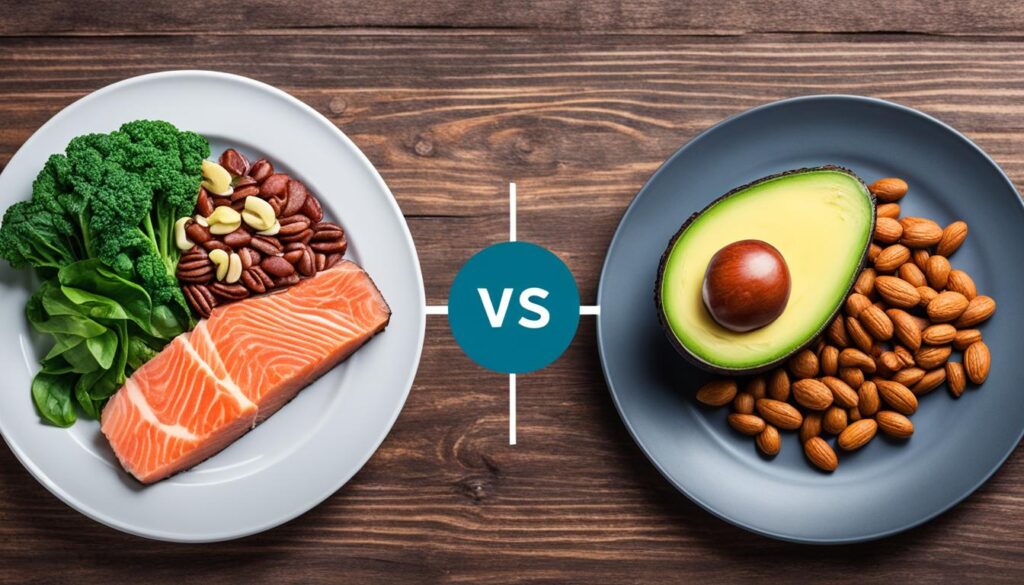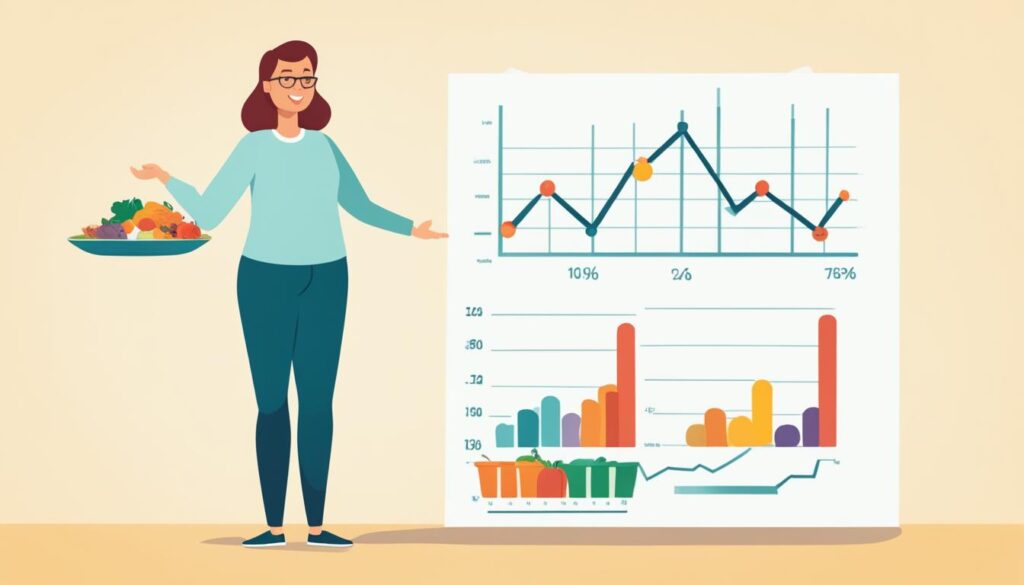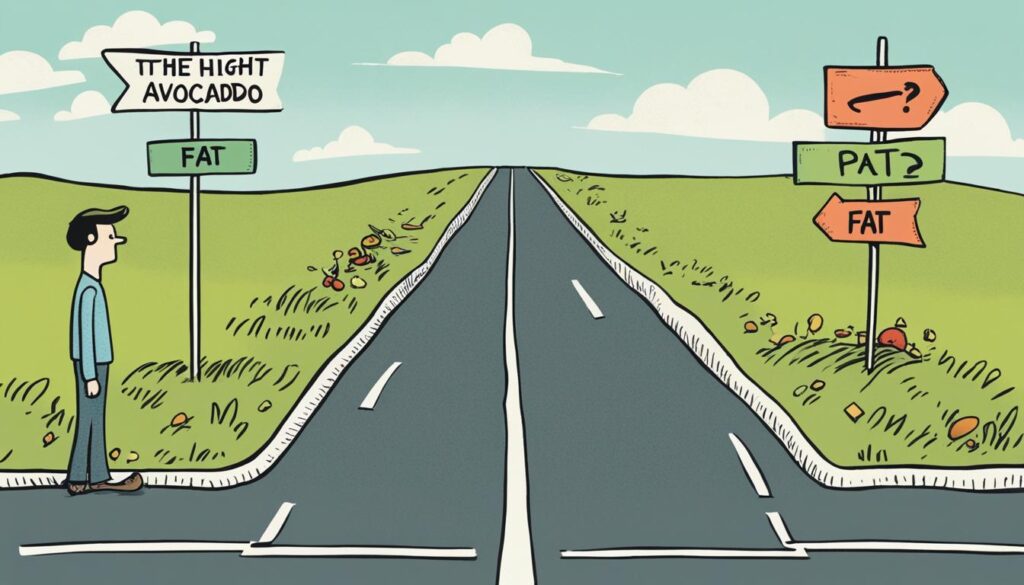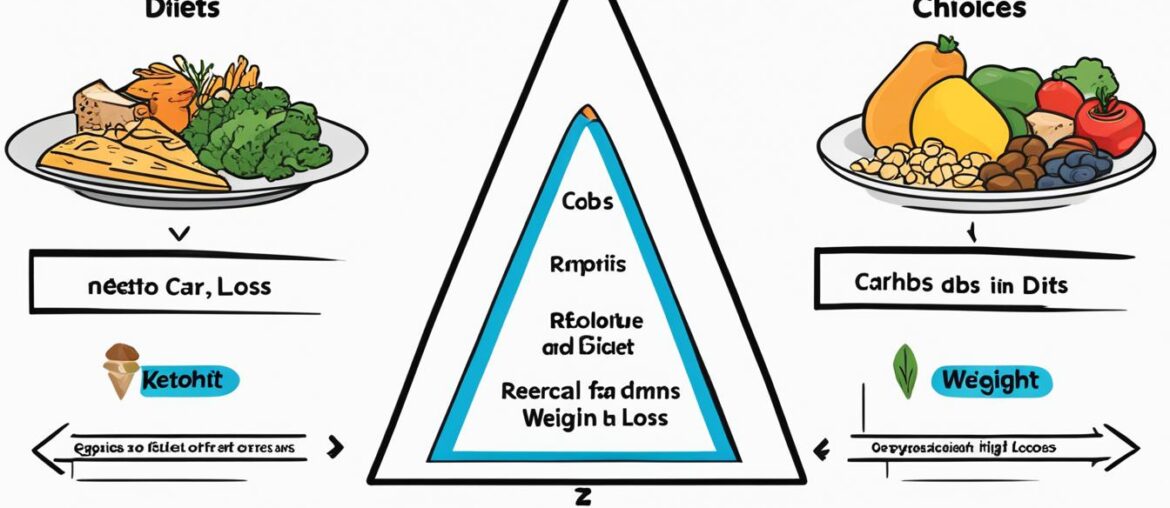Gaining weight and struggling to lose it can be a frustrating experience. With countless diets out there, it can be overwhelming to choose the right one. Two popular options for weight loss are the low-carb diet and the ketogenic diet. While they both involve restricting carb intake, there are some key differences between them.
The low-carb diet focuses on reducing the consumption of carbohydrates mainly from grains, sugar-sweetened beverages, and bread. It typically allows 10-30% of calories from carbs, which equals 50-150 grams per day for someone consuming 2,000 calories. This diet promotes fullness by increasing protein, healthy fats, and vegetables while cutting down on carbs.
On the other hand, the ketogenic diet takes carb restriction to another level. It is a very low carb, high fat diet that aims to achieve a state called nutritional ketosis. With a strict carb limit of 50 grams or fewer per day, the keto diet replaces carbs with fats as the primary fuel source. This extreme restriction puts the body into a metabolic state where it starts using fat as fuel.
When it comes to weight loss, both diets offer benefits. The low-carb diet can help with shedding pounds by reducing overall calorie intake, promoting fullness, and improving blood sugar control. It has also been associated with reducing cardiovascular risk factors.
The ketogenic diet, although more restrictive, can lead to significant weight loss by forcing the body to burn fat for fuel. It has also shown therapeutic benefits in managing conditions like epilepsy and improving insulin sensitivity.
Which diet is better for weight loss? Well, it depends on various factors such as individual preferences, health goals, and considerations. It’s important to choose a sustainable approach that fits your lifestyle and consult with a healthcare provider before starting any new diet.
In the upcoming sections, I will delve deeper into each diet, discussing their specific benefits, considerations, and differences. I will provide tips on how to choose between the two and offer comparisons of low-carb and ketogenic diets for weight loss. Let’s discover which approach may be right for you.
What is a Low-Carb Diet?
A low-carb diet is a way of eating that restricts dietary carbohydrates, mainly from grains, sugar-sweetened beverages, and bread. It is designed to help individuals reduce their carb intake and promote weight loss. On a low-carb diet, the focus shifts to increasing protein intake, incorporating healthy fats, and consuming ample vegetables to replace the carbohydrates and promote feelings of fullness.
When following a low-carb diet, the recommended carbohydrate intake typically ranges from 10% to 30% of total calories, which translates to approximately 50-150 grams of carbs per day for a person consuming 2000 calories daily. By reducing the consumption of high-calorie processed foods and eliminating many carb-rich options, individuals on a low-carb diet often experience weight loss due to a reduction in overall calorie intake.
A low-carb diet is not only beneficial for weight loss but also linked to several health benefits. It has been shown to improve blood sugar control and reduce cardiovascular risk factors, contributing to better long-term health outcomes.
https://www.youtube.com/watch?v=_uEWltsZGTI
| Key Components of a Low-Carb Diet: |
|---|
| 1. Restricted carb intake, focusing on avoiding grains, sugar-sweetened beverages, and bread. |
| 2. Increased protein intake to promote feelings of fullness and aid in muscle maintenance. |
| 3. Incorporation of healthy fats, such as avocados, nuts, and olive oil, as a valuable energy source. |
| 4. Emphasis on consuming a variety of vegetables to provide essential nutrients and fiber. |
What is a Keto Diet?
A ketogenic, or keto, diet is a very low carb, high fat diet that aims to reach nutritional ketosis. It restricts carbs to 50 grams or fewer per day while keeping protein intake moderate and increasing fat intake drastically. The goal of the keto diet is to shift the body’s metabolism to using fat as the primary fuel source instead of carbs. This is achieved by consuming a high amount of fat, a moderate amount of protein, and very few carbs. The body enters a state of nutritional ketosis when it produces ketones from fat in the liver and uses them as fuel. The ketogenic diet is more restrictive than a low-carb diet and may have more side effects, such as constipation and the keto flu.
Adhering to a keto diet means significantly reducing carbohydrate intake and increasing fat consumption. The focus is on consuming healthy sources of fats like avocados, nuts, and olive oil. By doing so, the body turns to fat as its primary source of energy, leading to weight loss and potential improvements in various health markers.
“The keto diet is rooted in the concept of using fat as fuel. By restricting carbohydrate intake and increasing fat consumption, the body enters a state of ketosis, where it relies on fat for energy. This shift in metabolism can have profound effects on weight loss and overall health.”
Key Differences Between Low-Carb and Keto Diets
The key differences between a low-carb diet and a keto diet lie in their carbohydrate, protein, and fat intake.
A low-carb diet typically allows 50–150 grams of carbs per day, while a keto diet restricts carbs to 50 grams or fewer. On a low-carb diet, protein intake is higher, whereas a keto diet requires moderate protein intake to prevent interfering with ketosis. Fat intake is significantly higher on a keto diet as fats replace carbs and protein.
Here’s a quick breakdown:
| Low-Carb Diet | Keto Diet | |
|---|---|---|
| Carbohydrate Intake | Allows 50–150 grams per day | Restricts carbs to 50 grams or fewer per day |
| Protein Intake | Higher | Moderate to prevent interfering with ketosis |
| Fat Intake | Significantly higher as fats replace carbs and protein | |
| Restrictions | Somewhat flexible | More restrictive |
| Side Effects | Possible constipation and the keto flu |
As the table illustrates, the keto diet is more restrictive in terms of carbohydrate intake, encourages a moderate protein intake, and requires a significantly higher fat intake compared to a low-carb diet. While both diets may have potential side effects, the keto diet may present more challenges like constipation and the keto flu.
It’s important to consider these key differences when choosing between the two diets.

Benefits and Considerations of Low-Carb Diet for Weight Loss
The low-carb diet offers numerous benefits for weight loss. By incorporating increased protein, healthy fats, and vegetables while reducing carbohydrate intake, this diet promotes a feeling of fullness and helps to reduce overall calorie intake. As a result, individuals can experience weight loss and improved blood sugar control, particularly beneficial for those with diabetes. Additionally, following a low-carb diet has been associated with a reduction in cardiovascular risk factors, such as improved cholesterol levels and blood pressure.
Increased Protein: The low-carb diet emphasizes higher protein intake, which can aid in weight loss by reducing appetite and promoting the feeling of fullness.
Healthy Fats: By incorporating healthy fats such as avocados, nuts, and olive oil, the low-carb diet provides essential nutrients and helps individuals stay satiated.
Carb Restriction: By restricting carbohydrate intake, the low-carb diet encourages the body to burn stored fat for energy, resulting in weight loss.
Improved Blood Sugar Control: The low-carb diet can be highly beneficial for individuals with diabetes or insulin resistance, as it helps to regulate blood sugar levels and reduce the risk of complications.
Cardiovascular Risk Factors: Research has shown that following a low-carb diet can lead to improvements in various cardiovascular risk factors, including reduced blood pressure, improved cholesterol levels, and decreased inflammation.
However, there are some considerations to keep in mind when adopting a low-carb diet for weight loss. Some individuals may experience temporary side effects like weakness or constipation as their bodies adjust to the dietary changes. Additionally, certain food restrictions and limitations on fruit intake may impact the variety of a person’s diet. It is crucial to evaluate the pros and cons and consult a healthcare provider before starting a low-carb diet to ensure it aligns with individual needs and health goals.
Overall, the low-carb diet offers a range of benefits for weight loss, improved blood sugar control, and cardiovascular risk factors. However, it’s essential to consider potential side effects and restrictions before embarking on this dietary approach.
Example Table:
| Benefits of Low-Carb Diet for Weight Loss | Considerations of Low-Carb Diet for Weight Loss |
|---|---|
| Promotes weight loss | Potential side effects like weakness or constipation |
| Improves blood sugar control | Restriction of certain foods and fruit intake |
| Reduces cardiovascular risk factors |
Benefits and Considerations of Keto Diet for Weight Loss
The keto diet offers a range of benefits for weight loss. By achieving nutritional ketosis, where the body uses fat as the primary fuel source, significant weight loss can be achieved. This happens due to the restricted carb intake, forcing the body to rely on stored fat for energy. The high fat content in the diet keeps you satiated and helps you avoid unnecessary snacking.
One therapeutic benefit of the keto diet is its potential to manage epilepsy. Studies have shown that this diet can reduce seizures in certain individuals with epilepsy. Additionally, the keto diet has been found to improve insulin sensitivity, making it a promising approach for individuals with type 2 diabetes.
However, it’s important to consider the potential side effects and limitations of the keto diet. Constipation is a common side effect due to the limited intake of fiber-rich foods. Some individuals may also experience the “keto flu,” which includes symptoms like fatigue, nausea, and headaches. Another consideration is the restriction of fruits, which are high in natural sugars and carbohydrates. Long-term data on the effects of the keto diet is limited, so its sustainability should be evaluated.
“The keto diet can be effective for weight loss and has shown therapeutic benefits. However, it’s crucial to be aware of the potential side effects and limitations before embarking on this diet.”
Considering the benefits and considerations of the keto diet, it’s important to make an informed decision for your weight loss journey. Consulting a healthcare provider or a registered dietitian can provide valuable guidance and ensure the best approach for your individual needs.

What are the Differences Between a Low-Carb and Ketogenic Diet for Weight Loss?
When comparing low-carb and ketogenic diets for real weight loss results, the main difference lies in the carb intake. A low-carb diet typically allows for a higher carb intake, whereas a ketogenic diet restricts carbs to a very low level, promoting the body to enter a state of ketosis for more efficient weight loss.
Choosing Between Low-Carb and Keto Diets for Weight Loss
When it comes to weight loss, choosing between a low-carb diet and a keto diet requires careful consideration of several factors. While both diets involve restricting carbohydrate intake, they have distinct differences that may impact your weight loss journey. Let’s explore the key factors to consider before making your decision:
Carbohydrate Intake
The main difference between a low-carb diet and a keto diet lies in their carbohydrate intake. A low-carb diet typically allows for 50–150 grams of carbs per day, whereas a keto diet restricts carbs to 50 grams or fewer. If you prefer a bit more flexibility in your carbohydrate choices, a low-carb diet may be more suitable. However, if you’re willing to adhere to stricter carb restrictions, the keto diet might be a viable option.
Protein Intake
Protein intake also differs between the two diets. A low-carb diet generally allows for higher protein consumption, which can provide satiety and help preserve muscle mass during weight loss. On the other hand, a keto diet requires moderate protein intake to prevent interference with ketosis, as excessive protein can potentially be converted into glucose. Consider your protein preferences and goals when deciding between the two diets.
Fat Intake
Fat intake is significantly higher on a keto diet compared to a low-carb diet. The keto diet focuses on using fat as the primary fuel source, resulting in a higher fat intake to compensate for reduced carbohydrate consumption. If you enjoy foods rich in healthy fats and are comfortable consuming higher amounts, the keto diet may align well with your preferences.
Restrictions
It’s essential to consider the specific restrictions of each diet before making a choice. A low-carb diet allows for a wider variety of foods, including fruits and certain whole grains. On the other hand, the ketogenic diet restricts certain food groups, including many fruits, starchy vegetables, and grains, to maintain ketosis. Take into account your food preferences and potential limitations when evaluating the restrictions of each diet.
Sustainability
A key factor in choosing a diet for weight loss is its sustainability. Think about your ability to maintain the chosen diet in the long term. Sustainability is crucial for achieving lasting results and preventing weight regain. Consider what type of diet you can realistically follow and enjoy over an extended period.
Health Goals
Lastly, reflect on your specific health goals. Each diet has different effects on various health factors, such as blood sugar control and cardiovascular risk factors. Consider whether you’re primarily focused on weight loss or if you have additional health concerns that may be better addressed by one diet over the other.
Ultimately, the decision to choose between a low-carb diet and a keto diet for weight loss depends on your personal preferences, goals, and health considerations. The less restrictive nature and greater sustainability of a low-carb diet may make it an ideal choice for most individuals. However, it’s essential to consult with a healthcare provider or a registered dietitian before starting any diet to ensure it aligns with your health needs and reduces the risk of complications.

Conclusion
Both the low-carb diet and the keto diet offer potential benefits for weight loss. The low-carb diet restricts carbs to promote weight loss and has been linked to several health benefits. By increasing protein, healthy fats, and vegetables, the low-carb diet can lead to improved blood sugar control and reduced cardiovascular risk factors. On the other hand, the keto diet aims to achieve nutritional ketosis and uses fat as the primary fuel source. It can result in significant weight loss and has shown therapeutic benefits for managing epilepsy and improving insulin sensitivity.
However, it is important to consider the pros and cons of each diet before making a decision. The low-carb diet is less restrictive and easier to sustain in the long term. It allows for a wider variety of foods and a higher protein intake. The keto diet, on the other hand, is more restrictive and may have more side effects, such as constipation, the keto flu, and limited fruit intake. Long-term data on the effects of the keto diet are also limited.
Before starting either the low-carb diet or the keto diet, it is crucial to consult a healthcare provider. They can provide personalized guidance based on individual health needs and goals. A healthcare provider can evaluate the suitability of each diet and reduce the risk of complications. When it comes to weight loss, it is essential to make an informed decision and choose the diet that best aligns with your individual needs.
FAQ
What is the difference between a low-carb diet and a ketogenic diet?
A low-carb diet restricts dietary carbohydrates, typically allowing 50–150 grams per day, whereas a ketogenic diet restricts carbs to 50 grams or fewer per day and replaces them with fats as the main fuel source.
What are the benefits of a low-carb diet for weight loss?
A low-carb diet can promote weight loss by reducing overall calorie intake, eliminating high-calorie processed foods, and promoting fullness. It has also been linked to improved blood sugar control and reduced cardiovascular risk factors.
What are the benefits of a ketogenic diet for weight loss?
A ketogenic diet can lead to significant weight loss by achieving nutritional ketosis and using fat as the primary fuel source. It has also shown therapeutic benefits, such as managing epilepsy and improving insulin sensitivity.
How do low-carb and ketogenic diets differ in terms of carbohydrate, protein, and fat intake?
A low-carb diet typically allows 50–150 grams of carbs per day, while a ketogenic diet restricts carbs to 50 grams or fewer. Protein intake is higher on a low-carb diet, while it should be moderate on a keto diet. Fat intake is significantly higher on a keto diet.
What are the benefits and considerations of a low-carb diet for weight loss?
A low-carb diet promotes weight loss by increasing protein, healthy fats, and vegetables while reducing carb intake. It has been associated with improved blood sugar control and reduced cardiovascular risk factors. However, there may be side effects like constipation and the restriction of certain foods.
What are the benefits and considerations of a ketogenic diet for weight loss?
A ketogenic diet can lead to significant weight loss by achieving nutritional ketosis and using fat as the primary fuel source. It has also shown therapeutic benefits and improved insulin sensitivity. However, the keto diet is more restrictive and may have side effects like constipation, the keto flu, and limited fruit intake.
How do I choose between a low-carb diet and a ketogenic diet for weight loss?
When choosing between a low-carb diet and a keto diet, consider factors such as carbohydrate intake, protein intake, fat intake, restrictions, sustainability, and individual health goals. A low-carb diet may be a better option for most people due to its less restrictive nature and easier sustainability.




